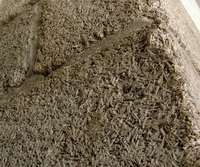Cape Town - Nomthunzi Naphakade's mood switches between anger, shame and resignation as she surveys the shack she shares with her mother, sister, brother and two young children.
The roof of the two-room tin and cardboard structure leaks in the rain and its walls shake in the wind. There is no running water or electricity. The family toilet is a stinking bucket emptied once a week.
Naphakade says she has seen little improvement in conditions during the 25 years she has lived in the Crossroads settlement. And she holds out little hope of change any time soon despite the pledges of candidates in March 1 local elections to speed up delivery of basic services to the impoverished millions still waiting for a better life promised them at apartheid's end over a decade ago.
"We've always voted and we will this time as well," said her 66-year-old mother, Nopasile. "But we've never seen any difference. There have just been promises, but no change."
The mood is equally bleak at a squatter camp perched on a hill overlooking the busy N2 highway between the airport and city centre. The inhabitants named it Europe, wistfully conjuring up hopes of a better life.
Bright pages from a magazine serve as wallpaper in Norah Didi's lopsided Europe shack. She said it's the only colour and romance in her grim life.
Nearby slums
A nearby slum is called Barcelona because it was built on a dump as a "temporary" settlement in 1992, the same year as the Olympics in the Spanish city.
Barcelona is still a blot on the landscape of the bleak Cape Flats townships, as are many other shack settlements which have a depressingly permanent aura about them.
In Cape Town alone, there are an estimated 260 000 families on the waiting list for housing. Less than 12 000 new homes were built in 2004, down from a 1997-98 peak of 43 800.
Nationwide, the number of households in shacks rose from 1.45 million to 1.84 million - a 26% increase, according to housing ministry figures since the country's first all-race elections in 1994.
This was despite the government spending nearly R30bn to build about 1.8 million new homes in just under 12 years.
Even though the government has made strides toward overcoming the legacy of racist white rule and providing basic services, the challenge is huge. Some 16 million people out of the 48 million population remain without adequate sanitation and 3.7 million have no access to clean water.
President Thabo Mbeki has vowed that the bucket toilet system - currently used by 230 000 households - will be eradicated by 2007; that all communities will get clean water and decent sanitation by 2010; and electricity by 2012. He has also promised to replace all shacks with houses by 2014. NEWS24
The roof of the two-room tin and cardboard structure leaks in the rain and its walls shake in the wind. There is no running water or electricity. The family toilet is a stinking bucket emptied once a week.
Naphakade says she has seen little improvement in conditions during the 25 years she has lived in the Crossroads settlement. And she holds out little hope of change any time soon despite the pledges of candidates in March 1 local elections to speed up delivery of basic services to the impoverished millions still waiting for a better life promised them at apartheid's end over a decade ago.
"We've always voted and we will this time as well," said her 66-year-old mother, Nopasile. "But we've never seen any difference. There have just been promises, but no change."
The mood is equally bleak at a squatter camp perched on a hill overlooking the busy N2 highway between the airport and city centre. The inhabitants named it Europe, wistfully conjuring up hopes of a better life.
Bright pages from a magazine serve as wallpaper in Norah Didi's lopsided Europe shack. She said it's the only colour and romance in her grim life.
Nearby slums
A nearby slum is called Barcelona because it was built on a dump as a "temporary" settlement in 1992, the same year as the Olympics in the Spanish city.
Barcelona is still a blot on the landscape of the bleak Cape Flats townships, as are many other shack settlements which have a depressingly permanent aura about them.
In Cape Town alone, there are an estimated 260 000 families on the waiting list for housing. Less than 12 000 new homes were built in 2004, down from a 1997-98 peak of 43 800.
Nationwide, the number of households in shacks rose from 1.45 million to 1.84 million - a 26% increase, according to housing ministry figures since the country's first all-race elections in 1994.
This was despite the government spending nearly R30bn to build about 1.8 million new homes in just under 12 years.
Even though the government has made strides toward overcoming the legacy of racist white rule and providing basic services, the challenge is huge. Some 16 million people out of the 48 million population remain without adequate sanitation and 3.7 million have no access to clean water.
President Thabo Mbeki has vowed that the bucket toilet system - currently used by 230 000 households - will be eradicated by 2007; that all communities will get clean water and decent sanitation by 2010; and electricity by 2012. He has also promised to replace all shacks with houses by 2014. NEWS24






No comments:
Post a Comment